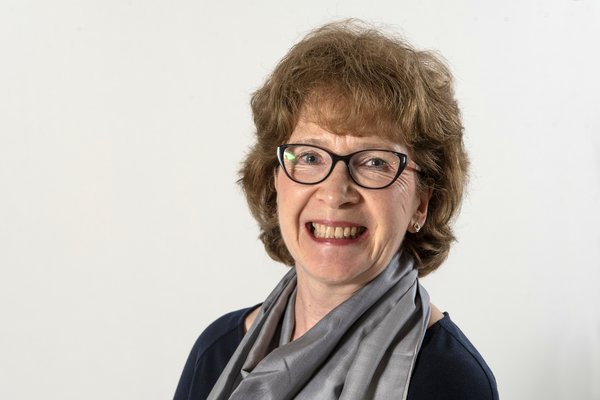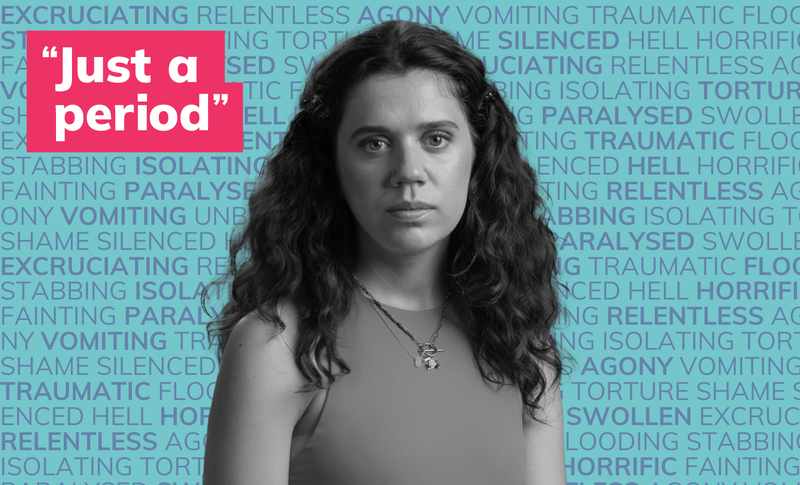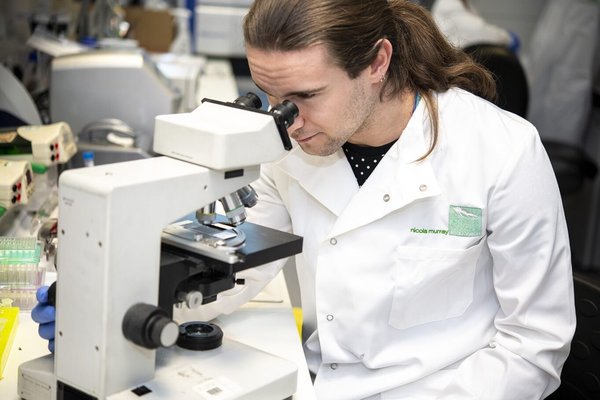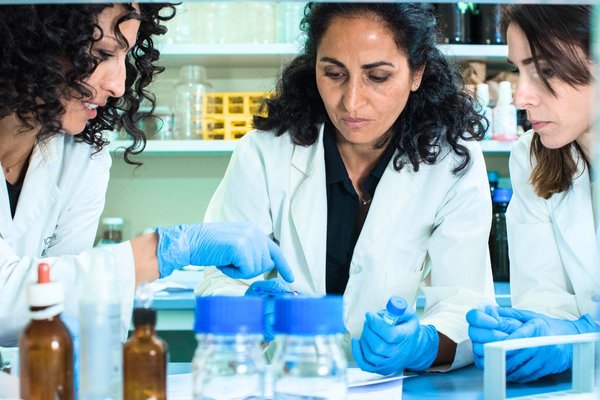
Wellbeing of Women announces Professor Hilary Critchley as the new Research Advisory Committee Chair
Wellbeing of Women has announced its Chair and Deputy Chair of its Research Advisory Committee.
Celebrities including football coach Emma Hayes, TV presenter Clare Nasir, influencer Alice Liveing and MPs Anneleise Dobbs and Caroline Nokes back our new campaign

Millions of women and girls in the UK suffer from period problems, such as severe pain and heavy bleeding, with almost one third never seeking any medical help, and more than half reporting their symptoms not taken seriously, finds a new survey of 3,000 women and girls, commissioned by the Wellbeing of Women charity.
Today, the charity launches its “Just a Period” campaign to address the unacceptable normalisation of period symptoms and gynaecological conditions, so that no woman or girl is left behind.
Despite effective treatment options being available, medical experts say severe pain and heavy bleeding are normalised, even within the healthcare system. Women and girls are not receiving the treatment, care and emotional support they need to manage these common, yet debilitating problems.
Women and girls have been dismissed for far too long. It's simply unacceptable.
Professor Dame Lesley Regan
Chair of Wellbeing of Women
Severe pain, heavy bleeding and irregular cycles are common symptoms in women and girls with gynaecological conditions, such as endometriosis, adenomyosis, fibroids and polycystic ovary syndrome which require treatment and support.
Yet women and girls are frequently ignored or, when listened to, were told that heavy and painful periods are ‘normal’ and that they will ‘grow out of them’, found the Women’s Health Strategy for England.
In a roundtable event to launch the campaign, football coach Emma Hayes diagnosed with endometriosis, influencer Alice Liveing who has PCOS, weather forecaster Clare Nasir who had surgery for fibroids, shared their experiences and struggles living with gynaecological conditions.
Also taking part was Caroline Nokes and Anneliese Dodds MPs, as well as media doctors, including Dr Nighat Arif, BBC Breakfast and ITV This Morning Resident Doctor, and Dr Philippa Kay who is also Resident GP for ITV This Morning.
A new survey of 3,000 women and girls, commissioned by Wellbeing of Women, found that almost all aged between 16-40 have experienced period pain (96%), with 59% saying their period pain was severe.
More than 9 in 10 have experienced some heavy periods (91%), with almost half (49%) saying their heavy bleeding was severe. Only 14% have tried medication to reduce heavy bleeding, despite treatment such as tranexamic acid being shown to reduce period blood loss by as much as 54%.
More than half (56%) have found it difficult to access treatment and support. Over half (51%) felt their healthcare professional had failed to take their period concerns seriously.
Of the 58% who sought help from a healthcare professional:
Over half (56%) of women and girls have felt their family didn’t take them seriously in relation to their period.
Almost half (47%) have felt their workplace didn’t take them seriously in relation to their period, and more than half (56%) have experienced problems at work in relation to their period.
Nearly 9 in 10 (86%) have experienced mental health problems, such as depression, anxiety and mood changes, in relation to their period. More than 4 in 10 (41%) say they have experienced severe mental health problems.
More than 4 out of 5 (82%/83%) agree that there needs to be more accurate, easily accessible information on periods and gynaecological conditions.
It was only until I was diagnosed with endometriosis stage five, a week before I had a hysterectomy, that I really realised what I'd been living with for so long.
Emma Hayes, football coach and campaign ambassador for Wellbeing of Women
Emma Hayes, award winning football coach for Chelsea Women’s Football Team and Campaign Ambassador for Wellbeing of Women, said:
“It was only until I was diagnosed with endometriosis stage five, a week before I had a hysterectomy, that I really realised what I'd been living with for so long. The last five years were spent being in absolute agony and it was debilitating on so many levels.
“Even though we had menstrual cycle coaches at work, there wasn’t anything I could do to improve my pain and symptoms from a nutrition, psychological or exercise perspective. I absolutely needed surgery.
“I'm an advocate of education and it’s why I am supporting the ‘Just a Period’ campaign from Wellbeing of Women. Together, we will raise awareness of women’s health, and the importance of treatment and support, so no woman or girl suffers for years like I did.”
Clare Nasir, Channel 5 Weather Broadcaster and host of BBC ‘Under the Weather’ broadcast, and Campaign Ambassador for Wellbeing of Women, talks about her experience of fibroids:
“With fibroids, there’s the physical pain but also the mental pain, I was struggling to conceive but looked about five-months pregnant. People would write into the show asking why I hadn’t declared my pregnancy. It took a toll on my mental health.
“When I eventually had my myomectomy, it was life changing. I’m passionate about raising awareness so that other women don’t feel alone and or suffer unnecessarily, and am proud to be working with Wellbeing of Women to ensure women get the help and support they need.”
Alice Liveing influencer and personal trainer, blogger and best-selling author, and Campaign Ambassador for Wellbeing of Women, says:
“I've had excruciatingly painful periods for as long as I can remember. I have passed out, been sick and taken days off work. Other women I speak to experience similar. I had to see many doctors before getting the treatment I’ve needed.
“Women should not be dealing with their pain or putting up with symptoms that disrupt their lives. I am proud to be an ambassador for the ‘Just a Period’ campaign by Wellbeing of Women. Let’s make sure women’s pain isn’t dismissed any longer.”
Professor Dame Lesley Regan, Chair of Wellbeing of Women, says:
“Women and girls have been dismissed for far too long. It’s simply unacceptable that anyone is expected to suffer with period symptoms that disrupt their lives, including taking time off school, work, or their caring responsibilities, all of which may result in avoidable mental health problems.
“Periods should not affect women’s lives in this way. If they do, it can be a sign of a gynaecological condition that requires attention and ongoing support – not dismissal.
“Through our ‘Just a Period’ campaign, we will be addressing the many years of medical bias, neglect and stigma in women’s health.”
Caroline Nokes, Conservative MP and Chair of the Women and Equalities Committee which is conducting an inquiry into reproductive and gynaecological health, says:
“There is a terrible phrase, ‘well, it's just a period’, why are you making a fuss about that? Can't you just get on with it? Yet many women and girls are experiencing horrendous period symptoms and gynaecological conditions.
“These are impacting the health of women and girls, and preventing them from taking part in work, school, sport and everyday life. Endometriosis alone affects 1.5 million women in the UK and costs the economy £8.2bn.
“Now is the time for change. I will continue to advocate for the needs of women and girls through my parliamentary inquiry and the ‘Just a Period’ campaign.”
Anneliese Dodds MP, Shadow Secretary of State for Women and Equalities, said:
“Over the past few years, we have opened up the conversation around the menopause and now we need to see this change with periods as well.
“It has been awful to hear testimony from women who have not been taken seriously when they needed and deserved treatment. From mental health issues related to dealing with unrelieved painful symptoms, to examples where women felt unable to go to work because of them, it’s clear that these symptoms can have a real impact on women – with knock-on effects for our economy.
“That’s why Wellbeing of Women are right to call on us all to never dismiss serious symptoms as 'just a period'.”
Our “Just a Period” information hub is here to help educate and empower. Get more information and support here.
If you have any symptoms or concerns, always speak to your doctor.

Wellbeing of Women has announced its Chair and Deputy Chair of its Research Advisory Committee.

We’re delighted to announce the funding of 17 new research projects tackling health inequalities and spanning the whole life course – from menstruation to menopause, pre-natal to postnatal, and gynaecological cancers.

Women make up 51% of the population, yet women’s health has not been prioritised.